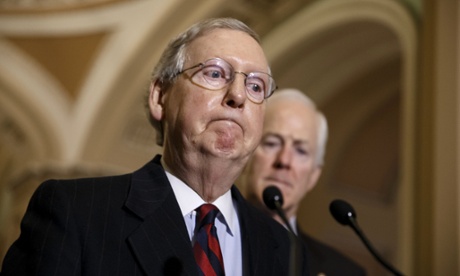“I believe that means this crash will see people’s deposits seized due to all of those laws passed since 2008.”
Congressional budget welcomes big bank bailouts once more despite White House opposition
Congress has agreed to use federal deposit insurance, which was designed to protect the savings accounts of consumers, to cover risky trading by the nation’s biggest banks.
In a small provision in the budget bill, Congress agreed to allow banks to house their trading of swaps and derivatives alongside customer deposits, which are insured by the federal government against losses.
Small budget provision, which repeals part of Dodd-Frank, allows banks to back their riskiest activities with the savings accounts of regular Americans.

Congress has agreed to use federal deposit insurance, which was designed to protect the savings accounts of consumers, to cover risky trading by the nation’s biggest banks.
In a small provision in the budget bill, Congress agreed to allow banks to house their trading of swaps and derivatives alongside customer deposits, which are insured by the federal government against losses.
The budget move repeals a portion of the Dodd-Frank financial reform act and, some say, lays the groundwork for future bailouts of banks who make irresponsibly risky trades.
“It’s both a stealth move and indefensible,” said Dennis Kelleher, the head of Better Markets, a group that argues for great oversight of banks. In a note to clients, he later called it “a sneaky, midnight repeal”.
The White House said on Wednesday it “strongly opposes” the provision.
“The main purpose…is to reauthorize the Terrorism Risk Insurance Program; this bill should not be used as a vehicle to add entirely unrelated financial regulatory provisions,” the White House said.
“If Wall Street gets the upside in big bonuses from its high-risk derivatives deals, then it should also have to pay the downside for any losses,” Kelleher wrote.
Richard Trumka, the head of labor union AFL-CIO, said his organizations also objected to the budget provision.
“Dodd-Frank forced too-big-to-fail banks to move potentially toxic speculation in derivatives out of their government-insured banks,” Trumka said in a statement. “Wall Street’s friends in Congress are trying to once again put the public on the hook for the most dangerous aspects of the financial system.”
Banks make their money primarily through two activities: lending out deposits to people or companies, and speculating on the markets. Laws like the defunct Glass-Steagall act were designed to separate the two activities. The Dodd-Frank rule recaptured a small part of that separation.
The budget provision, however, retracts the rule, which has been a thorn in the paw of giant banks like JP Morgan and Citigroup.
That rule, passed in 2010 and called the “swaps pushout rule”, dictated that banks had to keep certain arcane, risk-taking businesses away from customer deposits: swaps in stocks, commodities, and similar businesses.
Other derivatives, however, could still sit in the section of the banks protected by government backing. The derivatives business is a lucrative and concentrated one: 95% of the trading in derivatives in the US are done by the five biggest banks, Bank of America, Citigroup, Goldman Sachs, Morgan Stanley and JP Morgan. The banks have made more money in derivatives because they have government backing for deposits, Kelleher said. That’s no longer in place.
“The swaps pushout provision was saying US taxpayers should not be paying for risky trading activities,” said Kelleher.
Customer deposits – including the savings accounts of most Americans – are heavily regulated in size and scope by the federal government. The Federal Deposit Insurance Corporation (FDIC) provides a guarantee that, even if a bank goes under, customers can’t lose all of their money.
The FDIC was created in response to worries about “runs on the bank” in the 1920s and 1930s as stock market speculation, then the Great Depression, caused financial panic and destabilized the financial system.
Lobbyists for banks including Citigroup had previously tried to rewrite the provision, drafting as many as 70 of the 85 lines in one 2012 update. Source


